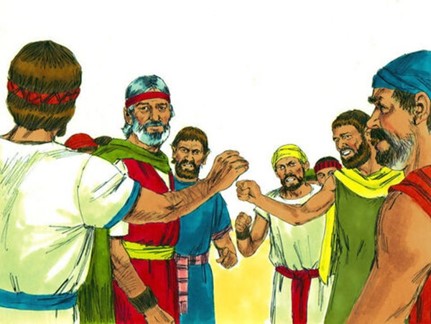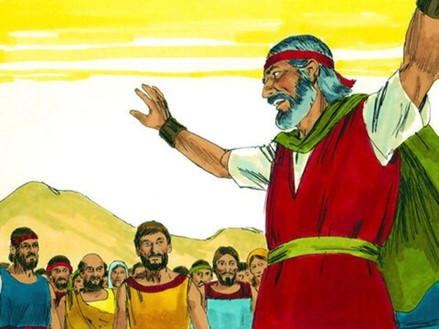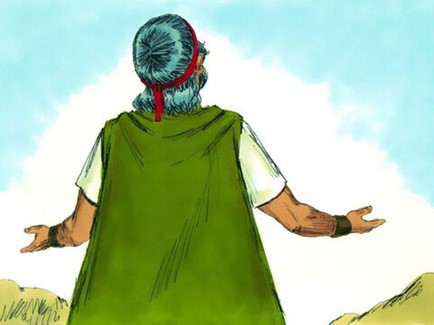Good morning!
Greetings in the name of the father, the son, and the Holy Spirit.
“The Lord bless you
and keep you;
the Lord make his face shine on you
and be gracious to you;
the Lord turn his face toward you
and give you peace.” (Numbers 6:24-26)
Don’t worry about anything; instead, pray about everything. Tell God what you need, and thank him for all he has done. (Philippians 4:6)

After searching for water in the middle of the desert, the Israelites found an oasis. But the water was bitter to their taste, and they complained. They were indeed still yet not dying out of dehydration. Then, Moses cried out to God in prayer for the Israelites with little faith. God heard Moses’ prayer. God showed him a piece of wood. Moses threw it into the water, which made the water sweet to drink. God pampered the Israelites and made them satisfied, although they complained to God. It is God’s love.
The Israelites are God’s beloved children and the most precious possession of God. But they were too immature to thank God regardless of the taste of the water. After the Israelites were fully satisfied, God taught them by setting God’s decree as a standard, as if parents tell their beloved children. Indeed, it was not for God but for the Israelites to test and prove their faithfulness to God.
God said to the Israelites through Moses,
“If you will listen carefully to the voice of the LORD your God and do what is right in His sight, obeying His commands and keeping all His decrees, then I will not make you suffer any of the diseases I sent on the Egyptians; for I am the LORD who heals you.” (Exodus 15:25)
All heard and nodded. Then all said in unison, “Yes, we will listen to God’s voice and do what is right in God’s sight, obeying God’s commands and keeping all God’s decrees.” They were fully satisfied and joyfully answered God.
It is far easier to say to God, “Yes, we will obey,” when God provides what we need. But as we don’t get what we want, it is not easy to keep thanking God, let alone trusting in God and obeying Him, because our eyes see things happening that are completely opposite from what we have been praying. A cloud of doubt rises quickly in our hearts, followed by doubting God we trusted. Then we start to complain to God. Initially, our complaint is small but grows quickly. It does not take time before our complaint is too big to control. When we hit this point, our faith in God can hardly be found in us, regardless of the stage of our journey with God. Then what’s coming next? Some fight against God and speak ill of God while saying God does not listen and does not provide what we absolutely need, as we have been speaking to God with our contrite and heartful prayer for a long time. How painful it is! Then out of pain and disappointment, along with a feeling of betrayal, some even leave God altogether.
Then how did God respond to us? Didn’t God keep loving us despite our unbelief, unfaithfulness, complaint, or even betrayal?
Jesus Christ answered the above question by using a parable.
“A man had two sons. The younger son told his father, ‘I want my share of your estate now before you die.’ So his father agreed to divide his wealth between his sons.
“A few days later, this younger son packed all his belongings and moved to a distant land, and there he wasted all his money on wild living. About the time his money ran out, a great famine swept over the land, and he began to starve. He persuaded a local farmer to hire him, and the man sent him into his fields to feed the pigs. The young man became so hungry that even the pods he was feeding the pigs looked good to him. But no one gave him anything.
“When he finally came to his senses, he said to himself, ‘At home even the hired servants have food enough to spare, and here I am dying of hunger! I will go home to my father and say, “Father, I have sinned against both heaven and you, and I am no longer worthy of being called your son. Please take me on as a hired servant.”’
“So he returned home to his father. And while he was still a long way off, his father saw him coming. Filled with love and compassion, he ran to his son, embraced him, and kissed him. His son said to him, ‘Father, I have sinned against both heaven and you, and I am no longer worthy of being called your son.’
“But his father said to the servants, ‘Quick! Bring the finest robe in the house and put it on him. Get a ring for his finger and sandals for his feet. And kill the calf we have been fattening. We must celebrate with a feast, for this son of mine was dead and has now returned to life. He was lost, but now he is found.’ So the party began. (Luke 15:11b-24)

Each morning, the father in the parable came to the window overlooking the path his younger son took when he left home with his portion of the father’s inheritance. Although the younger son left the father, the father’s heart was full of the younger son, and the father patiently waited for his younger son’s return.
His younger son finally got what he wanted and went away to a distant land and squandered all the money he had taken from his father’s house. His life became difficult and soon too harsh to continue living in the distant land. He found he was starving to death because no one had given him anything. Then he returned to his senses and returned to his father, although he was treated as a servant, not as a son. As returning, he felt he was extremely guilty because he had sinned against his father. But he had to return because no one gave him food.
However, the father was different. The father anxiously looked out the window from morning to evening daily to see his younger son’s return, not to miss even one second. One day, finally, the father spotted his son’s return a long way off. The father, filled with love and compassion, ran to his son, embraced him, and kissed him. His son confessed the sin committed against the father, and the father immediately accepted his prodigal son. The father did not ask anything but spoke his love to the son. Then the father ordered a big feast for his son and gave the big feast while saying, “My son was lost, but now his is found.” This is God’s love in a parable.
Why did the father want his son’s return sooner than later? What did happen to his son who went away? Didn’t he squander all with which he took away and return broken, empty, and in great pain to the father after experiencing great hardship in the distant land? The father knew what would happen to his younger son when he left with his portion of the inheritance.
Then what did the father want from his son from the beginning? Wasn’t it a true appreciation of the father’s love and giving thanks to the father?
What was the father’s approach taken for his prodigal son? Wasn’t it the father’s infinite patience and unfathomable love?
The father in the parable depicts our God, who is in love with infinite patience. God wanted the same love and patience from the Israelites while trusting in God rather than complaining about what they got from God.

Indeed, God provided water to the poor souls who walked through the desert for three days, but they refused to drink the water. They demanded particular water fitting their taste. Let’s think about the alternative scenario. What would have happened to them if they accepted the water, although it was bitter to their mouth? God would have directly taken them to the Promised Land instead of going through the wilderness till they proved their faith, trust, and love to God. Instead, God guided them through the paths of righteousness step by step with His love to fully mature their faith in God.
God provided abundantly. After leaving Marah, the Israelites traveled on to the oasis of Elim, where they found twelve springs and seventy palm trees. They camped there beside the water they liked to enjoy and drink and were fully satisfied.
Then the whole community of Israel set out from Elim and journeyed into the wilderness of Sin, between Elim and Mount Sinai. They arrived there on the fifteenth day of the second month, one month after leaving the land of Egypt. Again, the whole community of Israel complained about Moses and Aaron.
“If only the LORD had killed us back in Egypt,” they moaned. “There we sat around pots filled with meat and ate all the bread we wanted. But now you have brought us into this wilderness to starve us all to death.” (Exodus 16:3)

The Israelites again complained. Let’s see how the Israelites behaved before God for the period of one month since they left Egypt:
- Joyful while leaving Egypt joyfully (no real evidence that they first thanked God.)
- Fearful of being trapped between the Pharaoh’s army and the Red Sea.
- Complaining to God while telling Him it’s better to be a slave in Egypt
- Marbled while walking through the Red Sea on dry land
- Praising God by singing and dancing over God’s salvation against Pharoah’s army
- Only three days later, complaining again to God about no water
- God provided water, but they complained about the water’s taste till God made it sweet to drink.
- Again, Complaining to God for food.
Why didn’t they realize their behavioral pattern to God? They should remember how often they complained to God. They complained four times in one month but only once praised God.
How about us? What’s the ratio between our praises and complaints to God? Please count them for the last month. Then we will know about our attitude to God.
Again, God’s will was, is, and will continue to be providing the best to us because God is our Eternal and Ever-Loving Father. God kept providing to the Israelites, but the Israelites did not believe in God’s utmost goodness toward them and did not trust God. As soon as they saw the Pharaoh’s army, they complained about why Moses took them out of Egypt and died in the wilderness. Only three days later, walking through the Red Sea on dry ground, they complained because the water provided by God did not fit their taste. The most popular responses to God were to complain to God.
Then how did God respond to the Israelites? Yes, God was patient and provided like clockwork. No matter what the Israelites did, God provided the best out of His love with his merciful hand abundantly and gracefully. Mercy means something that we should get, but we don’t because of God’s merciful love. The Israelites should have received God’s judgment on their complaints, but God did not give them, which was God’s mercy in His love.
Why didn’t God directly respond to their complaints to Him with God’s judgment? God knew their complaints came from their spiritual immaturity. Thus, God was patient and always faithful despite their complaints because God wanted them to grow spiritually in Him. However, the Israelites undermined themselves further and their relationship with God by complaining instead of getting closer to God.

Indeed, God allowed them to prove their faith in God whenever they complained, but they failed to grasp even one opportunity. They kept failing to exhibit their spiritual maturity. For example, if they drank the bitter water and thanked God, God took them directly to the Promised Land. Why? They proved their faith in God, proving that they had enough faith to occupy the Promised Land not by sight but by faith, fully trusting in God whenever they confronted something humanly impossible to overcome.
Such challenges are not for the Israelites only but for us too. How often have you felt that you had been confronted with something about which you could do nothing because it was humanly impossible and beyond your ability?
Therefore, Bible says,
Now faith is the assurance of things hoped for, the conviction of things not seen. (Hebrew 11:1)
Faith is the assurance (title deed, confirmation) of things hoped for (divinely guaranteed) and the evidence of things not seen [the conviction of their reality—faith comprehends as fact what cannot be experienced by the physical senses]. Thus, faith allows us to transcend all understanding and to have peace in God under all circumstances, whether we feel or understand or not, by being one with God. God always waits for us to come to Him. God is truly patient with us, and His arms are wide open to us.
As we saw the Israelites, getting to the point of trusting in Him while believing God’s promise is difficult, but it is the key. The Israelites kept relying on their understanding rather than giving up being themselves altogether and giving in to God by completely surrendering to God and 100% trusting in Him.
We saw how the Israelites responded every time: they complained to God. On the other hand, Moses was calm. Yes, together with the Israelites, Moses saw the best of the best armies of Egypt quickly approaching to kill Moses and the Israelites. Two million fellow Israelites complained about the hopeless situation of being trapped between the Pharaoh’s army and the Red Sea. There was no water in the middle of the desert, causing them to be extremely dehydrated. There was no more food to eat in the middle of the wilderness, and two million fellow Israelites were in fear of starving to death. Yes, each of the situations was a disaster, which was real.

All the Israelites saw those disasters quickly coming and knew they were helpless before the disasters. Then they chose to blame and complain to God through Moses. This behavioral pattern repeated four times only in one month. Moses was the only one who did not complain, while two million Israelites kept complaining. Surely, Moses also saw the same disaster coming quickly. Additionally, Moses got enormous peer pressure from the two million Israelites. But Moses was calm.
Why? He was at peace because God was with him. Moses 100% trusted in God. Moses believed God, full of love toward His own children, the Israelites, would protect them from the hands of the Pharaoh’s army, provide water in the middle of the desert, and satisfy the Israelites with the food that God miraculously gave provided.
Yes, God did as Moses believed. God protected the Israelites by opening the path through the Red Sea while burying the Pharaoh’s army deep into the bottom of the Red Sea by returning the water. God also provided water to the Israelites, although the Israelites complained to God only three days after crossing the Red Sea and praising God while watching the dead bodies of the Pharaoh’s army wash up on the shore.
If we were the Israelites, could we behave differently? Please think about the answer to yourself while looking back at your own life responses to God as you met your life challenge(s). Have you complained to God only a few days after the highest thanksgiving to God for what He had done to you? Indeed, fear and pain are long membered while joy and thanksgiving are short-lived, which is our nature as human beings.

Therefore, faith is not what we see and touch but the assurance that only comes from God, who created the heavens and the earth. Faith is the evidence that we hope for in God, who loves us as His beloved children dearly. Thus, faith transcends all our understanding and keeps hoping for all things in Him, whom we can trust under all circumstances.
In the book of Hebrews, Chapter 11, the Bible says, after listing all the great names in faith,
the world was not worthy of them. (Hebrews 11:38a)
It is almost silly to compare the world with all of the forefathers in faith, listed in Hebrews Chapter 11 because they were bigger than the world. The only secret was their faith in God. Moses had such faith by walking humbly with God.
Do we truly desire to be like Mores, who was calm under all circumstances? Again the secret is faith in God. How to overcome all things in Him? Just present our request to God with a contrite and humble heart. Surely God will answer by pouring His spirit into our hearts and will walk with us as God did with Moses from now and forever.

Then you will experience God’s peace, which exceeds anything we can understand. His peace will guard your hearts and minds as you live in Christ Jesus. (Philippians 4:7)
